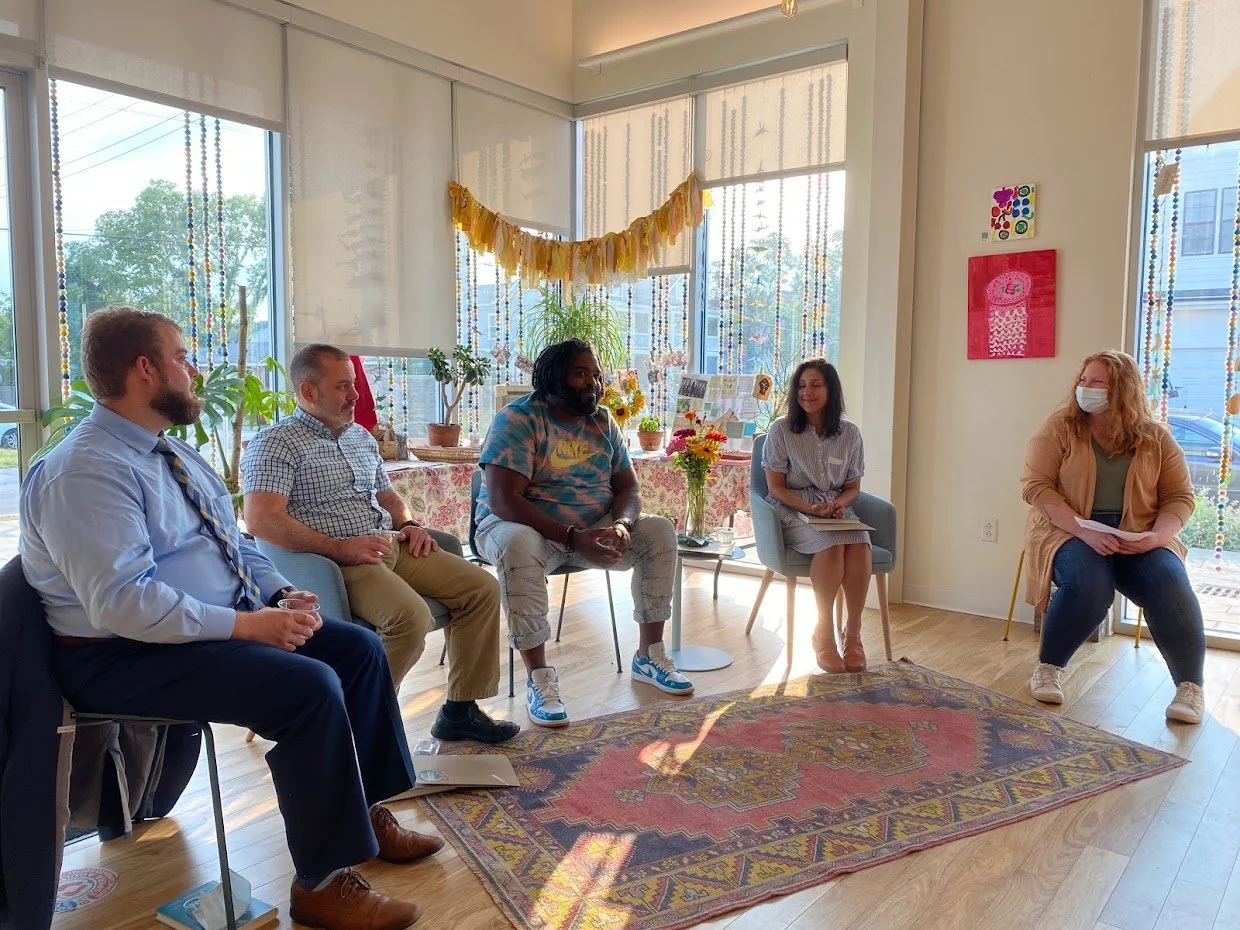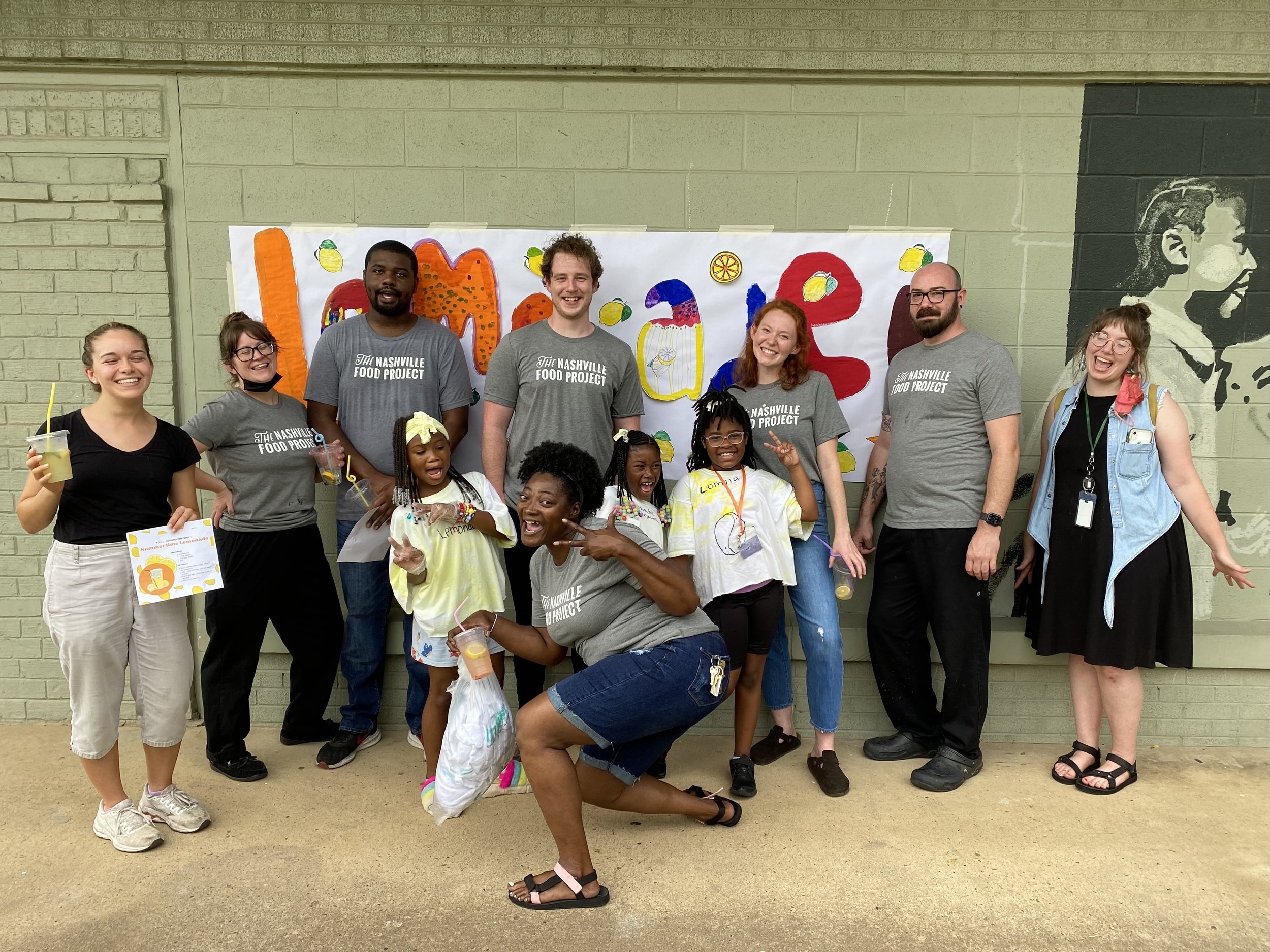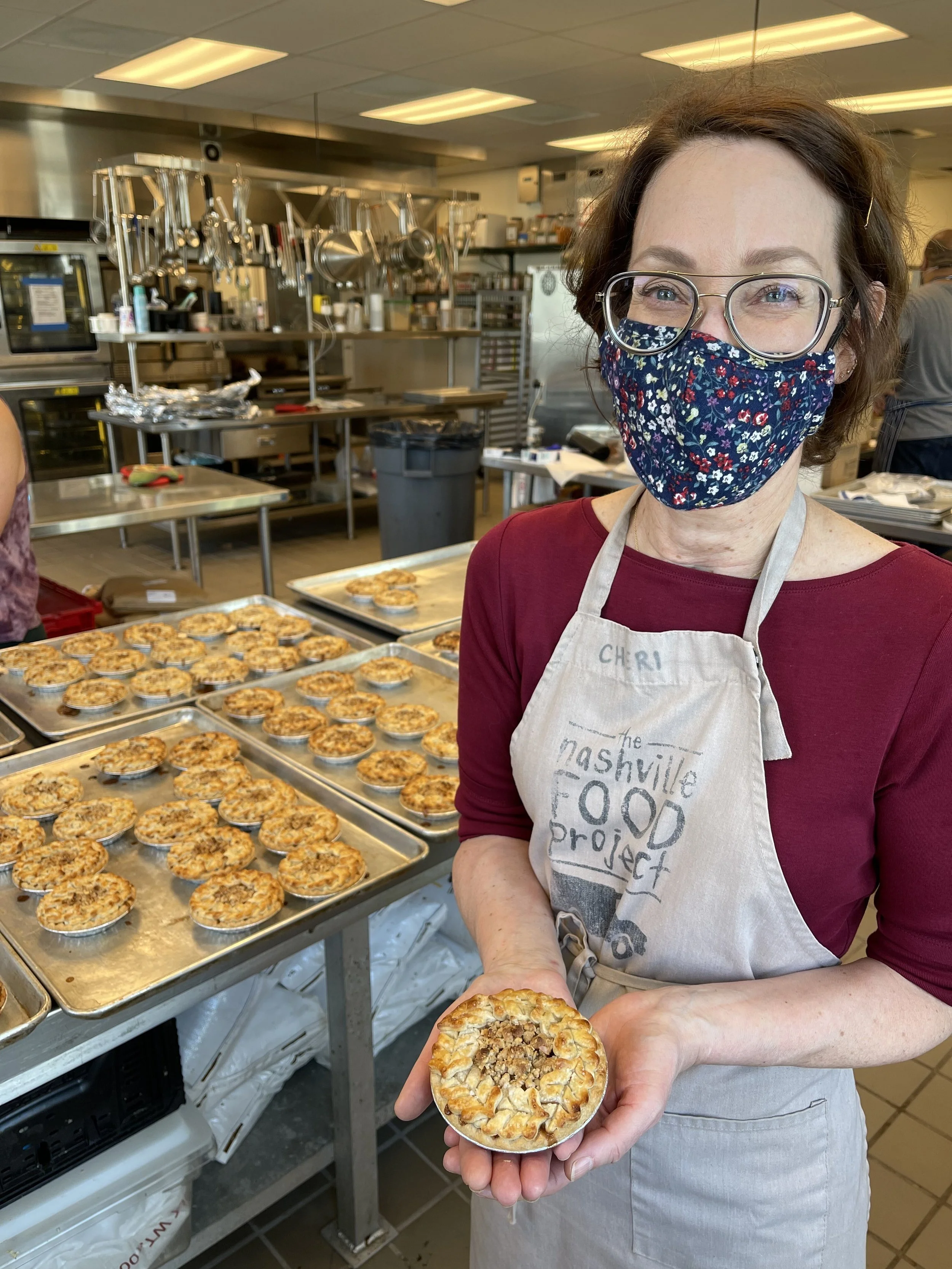Amy and Denise met each other when they were dropping their kids off to kindergarten at a local Nashville elementary school. They clicked, and for the past 20 years have been pretty much inseparable friends. They go on family vacations together, do lunch together, and volunteer at St. Luke’s Kitchen as a Cook Team.
Recipes from the Growing Together Farm: Lu Ja's Fried Rice
By Gabby Raymond, AmeriCorps Food Justice Storytelling Content Leader
Lu Ja, Growing Together’s newest farmer
"I'm already 30, I need to eat healthy now," says Lu Ja as she vigorously stirs long beans sizzling in a pot with a little oil. She is preparing fried rice homemade style, which she describes as different from restaurants because of its simplicity and lack of lots of salt or MSG.
Lu Ja has two young sons at home, and so she often cooks easy to make, quick meals at home. A go-to meal for her is steamed chickpeas sauteed with garlic and rice, which she used to eat frequently in Myanmar. When she wants to incorporate more vegetable into her meals, she will make this fried rice.
"The tongue likes sweet and spicy," says Lu Ja. "But this meal is for a full stomach."
Lu Ja’s Healthy Fried Rice
Ingredients
2 cups cooked jasmine rice
Salt to taste
Sugar to taste
Black pepper to taste
5 to 6 cloves of garlic
Cherry tomatoes, halved
Mixed bell peppers, diced
Long beans, sliced
1 bunch water spinach, chopped
2 eggs
Vegetable oil
Instructions
Add 1 tsp. neutral oil to a pan on medium high heat and cook egg until done. Transfer to a bowl.
Massage 1 tsp salt into cooked rice.
Add more oil to the pan and cook long beans until soft.
Stir continuously and add salt, sugar and pepper.
Add bell peppers and when incorporated stir in chopped water spinach and rice.
Combine, add in chopped egg and stir in any additional seasoning.
Let rice cook until you can hear it begin to crackle.
Stir and then add tomatoes and Thai basil leaves and flowers.
Stir and scrape the bottom to incorporate any crunchy bits.
Although the eggs and vegetables are flavorful on their own. if you're looking to pack a little more punch to the flavors of this dish, you can incorporate your own sauce when you add the rice.
Option 1:
1/2 tsp sesame oil
3 tsp soy sauce
Option 3:
3 tsp fish sauce
1 tsp oyster sauce
1/2 tsp sugar
Option 2:
1 1/2 tsp soy sauce
1 1/2 tsp dark soy sauce
For the best consistency when making fried rice, use cold leftover rice. Day old rice works perfectly because it will not become mushy when frying.
Vegetable fried rice can also be garnished with chopped scallions or cilantro and served with tomatoes and cucumbers on the side. You can also add chicken or shrimp if you don't want a strictly vegetarian dish.
Recent Favorites from the Kitchen
Lately in our kitchen, we’ve been getting creative with the gifts of food we steward! Here are a few of our favorite meals to come out of the kitchen as of late:
Julia’s Monte Cristo Bake
In January, we gratefully received a huge donation of hams from Aldi. We relied on a few classic ways to incorporate it into meals — carbonara, pineapple glazed ham, pork fried rice — but 1,800 pounds is a lot of ham! Luckily, our meals director Julia is always thinking creatively about how make the best use of our resources and dreamt up this Monte Cristo bake.
A Monte Cristo is a ham and cheese sandwich dipped in egg and fried up like french toast. Julia deconstructed this beloved sandwich into a casserole and topped it with homemade strawberry sauce and powdered sugar! To round out the breakfast-for-dinner theme, it was delivered alongside roasted breakfast potatoes and fresh fruit smoothies. A nourishing new favorite!
Mary’s Muffulettas
Ever had a New Orleans muffuletta? They're made by layering traditional Sicilian sesame bread with olive salad, salami, ham, mortadella, provolone and swiss cheese. Mary Elizabeth leaned on her Cajun roots and prepared a bunch of these delicious sandwiches to help our partners celebrate Mardi Gras, which fell on the very next day!
She made the best use of what we had on hand and put the Food Project spin on this sandwich, down to an olive salad that mixed traditional ingredients like olives, carrots, celery, red wine vinegar, and oil with some flavorful additions like hearts of palm, artichoke hearts, and banana peppers. It was a tasty lunch right in line with those hearty, rich Mardi Gras flavors!
Six-Layer Thanksgiving Casserole
Who says we have to wait until Thanksgiving to make — and enjoy — dressing? A massive turkey donation and some lingering cans of cranberry put us in the mood for some classic Thanksgiving food this Presidents’ Day, so we decided to combine all of our favorite flavors into one dish.
We started with turkey, pulled by the hands of faithful volunteers, and then topped it with cranberry sauce, mixing it up so that every bite of turkey included that bright, tart cranberry marinade. Then we added green beans, fresh veggies, scratch-made gravy and dressing with all the fixins and baked it into a casserole! It was like the classic Thanksgiving “perfect bite” over and over again.
Reminding Each Other of the Goodness
Growing Together to Build Food Security
Can you imagine 27,000 pounds of produce? Now picture that being grown by the patient hands of just four families on less than a single acre of land. This is the work of Growing Together, an urban farm in southeast Nashville jointly stewarded by immigrant and refugee farmers and The Nashville Food Project.
Bianca Morton, Chief Culinary Officer of The Nashville Food Project
Leslie’s Reliable Joy
As soon as Leslie steps foot in the kitchen, she is ready to help. She has been volunteering at The Nashville Food Project since 2014, and has since become an integral member of both the tight-knit community in our satellite kitchen at St. Luke’s Community House as well as our lively headquarters kitchen.
Feels Like Home: A Welcoming Week Event at Mill Ridge
By Elizabeth Langgle-Martin, Director of Community Engagement
Nestled on just three acres of Metro’s Mill Ridge regional park, the Community Farm at Mill Ridge is wrapping up its fourth growing season in this sacred place. A space for connection: connection with culture, community, land, and food cultivation, the Community Farm at Mill Ridge was a connecting point for almost 80 families of growers this year. Whether engaged in communal production as part of our Full Circle communal growing programming, or by stewarding and harvesting from an individual plot, this community continues to be a space of shared learning and liberation.
The Community Advisory Council of the Community Farm and the staff of The Nashville Food Project co-hosted a community event inviting both farm participants and the wider community to connect over food in this shared space. This gathering took place as a part of Welcoming America’s Nationwide Welcoming Week. Through Welcoming Week, organizations and communities nationwide bring together neighbors of all backgrounds to build strong connections and affirm the importance of welcoming and inclusive places in achieving collective prosperity.
Upon entering the farm on the day of the event, hands of all ages could be found wielding a paintbrush under the guidance of local artist Ruben Torres, who imagined a landscape where participants could be invited to paint different panels in vibrant colors before the panels were assembled to create a vivid image along the farm’s fenceline.
L-shaped tables under the toolshed sat heavy with covered dishes from the kitchens of gardeners and other event attendees. Saraí Tovar noted that she loved how the food was a perfect representation of the vibrancy of the Antioch community.
Kids ran wild with freshly painted faces, a temporary tattoo or even muddy hands from a wildflower seed ball station where Community Farm Manager, Nora, led folks in a simple method of seed saving.
Just out of sight, friends from Oasis Center led the transformation of one of the farm’s functional water catchment systems, turning it into yet another canvas for community art and inspiration, capturing portions of TNFP’s values in looping script next to bright depictions of pea pods and flower blooms.
Gardeners could be found pointing out their plots to visitors, a few friends leaving with arms filled with a hastily gifted harvest. As the afternoon wrapped up, amongst the forgotten plates and crumbled napkins, exchanged phone numbers were found scribbled on compostable table cloths, reminiscent of invitations to stay in touch.
As we continue to learn collectively about different expressions of community and belonging, we are constantly inspired and challenged by the many faces and hearts that create a place of welcome along the backdrop of a thriving community farm that often feels like home.
Photos shared with permission and courtesy of Aidan Fitzpatrick Photography. Find Aidan on Instagram here.
Anatomy of a Meal
Project Glean: A New Kind of Produce Share
Tucked on the far side of the Trevecca Nazarene University campus is a church beloved by students, staff and neighbors of the school. Behind Trevecca Community Church is Trevecca Towers, an affordable housing community of almost 600 residents positioned adjacent to Murfreesboro Pike. The closest major grocery store is over three miles away in Berry Hill, an affluent neighborhood that takes 30 minutes to reach by bus — on a good day.
A few years ago, two church members were talking about the lack of fresh food accessibility for the church’s hilltop neighbor. They decided to do something about it, and Trevecca Community Church’s Project Glean was born.
Project Glean aims to disrupt cycles of poverty by challenging many of the aspects that contribute to the existence of food deserts, including access to reliable transportation, economic disparities and educational opportunities. As they searched for more immediate ways to help, they dreamt up something now known locally as the Neighborstand.
“Part of TCC’s missional statements is our goal to ‘build bridges between our neighbors in holy love to transform the world in shape of God’s Kingdom,’” said Gail Pusey, a church leader and Trevecca faculty member. “One such bridge would be to offer a free, weekly, fresh-produce market to all interested Trevecca Towers residents.”
The Neighborstand features produce grown by the seven farmers who participate in Growing Together, an urban farm stewarded by The Nashville Food Project. But the way the produce gets from the Growing Together farm to the Neighborstand involves many hands: at the beginning of the season, Trevecca Community Church bought 26 shares of Growing Together’s community-supported agriculture (CSA) program. They sold those shares back to church members, and now, church members donate some or all of the weekly produce share to the Neighborstand.
“Many of Trevecca Community Church’s people know they are blessed, but also desire to be a blessing to others. They enjoy the interaction with TT friends who attend the church and its activities,” Pusey explains. “The beautiful residents themselves bring much to the table and enhance our congregation. TCC looks forward to increasing and promoting all aspects of Project Glean. Our motto is to ‘Love God, Love People, and Serve the World.’ Project Glean allows them to demonstrate this motto through their actions.”
Each CSA box contains 8-10 different types of vegetables and herbs. But since the seven farmers each manage their own plots, including choosing which crops to grow, one farmer’s veggie box may look completely different than another’s. Because Trevecca purchased shares from all of the farmers, the church ends up with a large variety of produce to distribute each week. The produce has been a hit, and it’s had the added bonus of bringing people together and creating connections among neighbors!
One of the priorities of The Nashville Food Project’s Growing Together farm is to share fresh, culturally appropriate produce with families experiencing food insecurity. We’re floored by the way that Project Glean used our CSA program to do just that in their own neighborhood! We’re grateful to the folks at Trevecca Community Church and Project Glean for reminding us of the deep interdependence at the center of community food security.
Stronger Together: Partner Panel & Paletas Recap
Around here, we talk often about treating hunger as just one symptom of poverty. Almost always, the individuals and families who are facing barriers to food access also experience an array of other barriers. Our vision for a more just, sustainable food system relies on the critical work of many to disrupt poverty’s diverse symptoms, which is why our partnership model is essential to the work we do.
Earlier this summer, we were proud to host a panel of partners to discuss just this. Organically, it turned into a session where we dreamt together about new, deeper ways to uplift each other, with the shared understanding that we all have a greater opportunity to thrive when we are in community with one another.
When we work interdependently and freely share the resources entrusted to us, we tap into a version of community that no longer sees people as problems to solve. Instead, we move toward a system that resources individuals and families to thrive in their own way, in their own right, with their own power. This version of community affirms the dignity of every one of its members and builds a new sense of reliance on the gifts each of us have to offer.
We left the panel with a renewed sense of hope for the future of communities that have traditionally been marginalized and under-resourced. So much vibrant work is happening right here in Nashville, and the collective work that is possible through our city-wide network of partners moves us closer to a just and sustainable world.
Panel Participants
The Branch of Nashville
The Branch strives to build a community where everyone can thrive by nourishing, educating, and equipping our neighbors. In response to the needs present in the South Nashville community, The Branch has focused their programming efforts on a food pantry as well as an English Language Learning program for adults.
Older Adult Care and Community Engagement Director Sarai Tovar joined our panel to share her perspective about community power through The Branch’s unique lens. She’s been with the organization since 2017 when she became part of their volunteer force. She is passionate about cooking, serving others, and parenting her two young children.
Preston Taylor Ministries
Preston Taylor Ministries empowers children and youth to discover and live their God-inspired dreams, develop a love for learning, and build joy-filled friendships that glorify Christ Jesus. Their areas of impact for youth are diverse, and their after-school programming spans seven sites across Nashville and enriches students socially, spiritually and academically.
Executive Director Dwight Johnson has a passion for working with teenagers, specifically middle schoolers, and enjoys seeing youth reach their potential. He is the author of Black Boy Soar, a children’s book written to help inspire and encourage young people of color to dream big, know who they are and what they are capable of.
Nashville International Center for Empowerment
The Nashville International Center for Empowerment works to ensure that refugees and immigrants achieve their full potential now and for generations to come. Their goal is to empower folks with resources and opportunities that will aid them in their resettlement and equip them to be successful in the future. Their partnership model, commitment to advocacy, community-building and sustainable service programs make their programming come to life.
Director of Education Brandon White oversees programming designed to support immigrants and refugees integrating into American society. His background is education, and he has worked as a teacher across private, public and non-profit sectors.
Community Care Fellowship
Community Care Fellowship, affectionately known as Ken and Carol’s, has a mission to serve Christ by offering hope, love and resources to our neighbors experiencing housing insecurity. They meet guests’ immediate needs, and then work to stabilize them before helping them secure permanent housing.
Executive Director Ryan LaSuer is constantly turning towards servant leadership. This commitment has helped him over the course of 15 years serving nonprofit organizations, and a strong foundation in marketing, grassroots promotion, client engagement and stakeholder relations gave him a unique perspective during our panel.
With Treats from Cosecha Community Development
Thank you so much to Cosecha Community Development for providing the paletas that we shared with our guests!
As part of their youth mentorship program, they have pioneered a before-school program for middle schoolers to grow their social enterprise, Cosecha Paletas. Through this program, students are able to learn entrepreneurship and kitchen skills.
Arroz con Berenjena
When Life Hands You Lemons
Sometimes on a sweltering July day, you can only beat the heat one way: with a cold glass of fresh-squeezed lemonade, made by the hands of neighborhood kids. For generations, the lemonade stand has been a quintessential summer activity. And this year, we were honored to help our longtime partner, Preston Taylor Ministries, with theirs.
Preston Taylor enrichment camp directors Alyssa Muller and Toni Cobbins first came up with the idea to host a lemonade stand when they were brainstorming about summer programming together last spring. “We both loved the idea of giving the students ownership of something as a way to raise money, like a business,” explained Alyssa. “A lemonade stand seemed like a tangible way that we could do this.” It was a win-win: students could feel pride in getting to share their own hard work with neighbors, and proceeds would support an end-of-summer celebration for PTM students at St. Luke’s Community House and the Wilson Center.
Often, the best part of a lemonade stand is concocting your masterpiece — and that’s where the Nashville Food Project got to participate. A few days before the event, Chef Bianca and her team brought over boxes of donated lemons to Preston Taylor sites. But instead of simply donating fruit, both organizations saw the opportunity to deepen our partnership. “A big part of community is building relationships,” explained Chef Bianca. “An intentional part of the success of our meals is to connect with our partners.”
It was in that spirit that Preston Taylor Ministries invited our meals team to teach their students about making lemonade. It was the first time most of our staff had spent with PTM students, but it’s hard not to instantly connect over squeezing lemons, scooping sugar and shaking the mixture to make the delicious drink (of course, taste-tested immediately).
The relationship between The Nashville Food Project and Preston Taylor Ministries has always been one of interdependence. Over the summer, Preston Taylor Ministries supports about 220 elementary and middle school students with day programming focused on experiential learning, academic enrichment, wellness and community. Between their sites at Wilson Center and St. Luke’s Community House, we share nearly 400 meals each week during the summer months. But we rarely get a chance to work together in real time, side-by-side. “It was fun to get outside of our own kitchens and see the enthusiasm of the kids in the Preston Taylor Ministries sites,” said Chef Bianca.
After two afternoons of prep, we were ready to open for business! Homemade signs adorned the building at PTM’s Wilson Center and excitement buzzed in the air as 2 p.m. approached and a preliminary line began forming at the tent. As customers arrived with their $3 in tow, students worked together to pour the lemonade, garnish it with a variety of fruits and herbs, and top it off with a bendy straw.
“Seeing the joy and pride in their faces during prep at each site and at the actual lemonade stand was priceless and knowing they worked hard in providing this was just the sweetness we needed to bring their lemonade to life.”
The best part of the afternoon was the community that gathered. Friends, families, neighbors and strangers gathered on the lawn of the Wilson Center to cool off and catch up. Students squealed when they saw their friends in line, and there were frequent pauses in the lemonade assembly line for hugs. Being there to see it all reminded us how community is central to our work: it nourishes the spirit like food nourishes the body.
It’s like the old saying goes: When life hands you lemons, make lemonade. Preston Taylor Ministries took it one step further to take lemonade and make a community.
Calling All Architects: Design Competition!
The way we see it, a garden is more than just a place to grow tomatoes and cucumbers — it’s also a space that supports community vitality. At the Community Farm at Mill Ridge, a growing number of gardeners come together to host educational workshops, connect with neighbors over potlucks and dream about the future of growing food in our city. And while we have plenty of rows to plant seedlings, our work to expand community in our city is sometimes limited by the physical space we can offer to garden participants. With the availability of an operational on-site pavilion, local families and gardeners will have deeper opportunities to learn, grow and connect right in their own neighborhood.
The Nashville Food Project, in partnership with Hodgson Douglas Landscape Architects, is excited to announce a design competition for a pavilion and wash-pack station at the Community Farm at Mill Ridge. Use your creativity to help us improve the Community Farm!
First-place and second-place winners will be awarded cash prizes. Submit your conceptual design by September 30 to enter.
View the competition guidelines and design specifications here.
Tips from the Gardens: Starting Seeds
Partner Spotlight: The Ark
Sweet Peas 2022: Setting More Places at the Table
For many children, school is essential in providing both an enriching community and nourishing meals. Our summer meals partners work hard to ensure that when the school year ends, kids don’t lose access to either of these critical things. Thanks in part to Jackson®, our fourth year of Sweet Peas: Summer Eats for Kids kicks off this June!
Reflections on Simmer: What We Wish Were True
We were so grateful to gather together again at Simmer, the chef pop-up dinner we held in April! This was a special one as it honored our beloved founder, Tallu Schuyler Quinn, and brought together the minds of several local chefs and friends to celebrate the release of her memoir, What We Wish Were True.
Meet the 2022 Growing Together Farmers
The 2022 Growing Together harvest season is kicking off! With CSAs and produce shares about to begin, it is important for our community to know the farmers who grow their food. Lal Subba, Chandra and Tonka Poudel, Sumitra and Pabitra Guragai, Nar and Tek Guragai, and La Sa Roi all steward plots at our Growing Together farm, and their personalities are each as vibrant as their veggies.










































